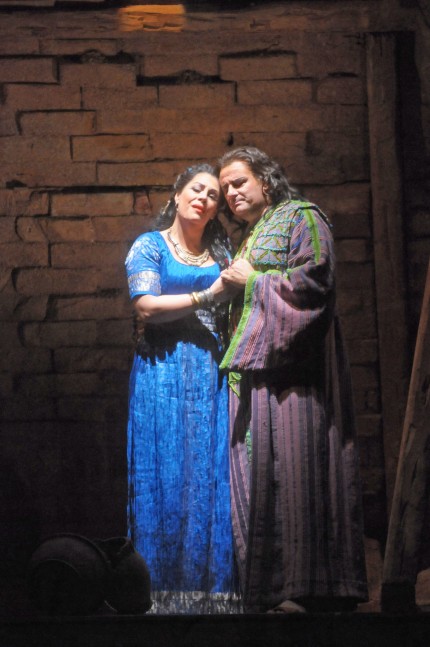Giordani and a worthy cast belatedly ignite the Lyric Opera’s “Aida”

Sondra Radvanovsky and Marcello Giordani in the Lyric Opera of Chicago's "Aida." Photo: Dan Rest
Without trying too hard, one can think of any number of reasons why Aida should be problematic for 21st-century audiences: stock wooden characters, a ludicrous historical scenario, hoary Meyerbeerian pageantry and a fair amount of three-ring theatrical humbug.
There’s just that pesky issue of Verdi’s magnificent music — the principal reason why this tale of tragic love among the dunes has remained so compelling for the past one-and a-quarter centuries. The difficulty, of course, is fielding a group of singers that can handle the daunting demands of the score, providing the requisite power as well as the emotional intimacy.
The Lyric Opera of Chicago’s revival of Aida, which opened Saturday night at the Civic Opera House, took awhile to hit cruising speed, with the first two acts feeling decidedly stiff and stagy. Yet with Marcello Giordani leading a strong cast and crackling musical direction by Renato Palumbo, the performance gained in dramatic cut and vocal intensity as the evening unfolded, rising effectively to the tragic heights of the final scene.
The tale of the doomed love between the Egyptian general Radames and the Ethiopian slave girl Aida remains nearly as renown for its stage trappings as Verdi’s music. Yet it is those very theatrical excesses that make the opera seem so dated today. Even with graceful stylized dancing (choreography by Kenneth von Heidecke) from the large ballet corps and majestic orchestral playing in the Triumphal March — one hapless trumpet ringer apart — it all feels overblown and silly. You find yourself wishing for the Marx Brothers to enter the stage and decimate the proceedings as they did with Il Trovatore in A Night at the Opera.
But, as they say, if you like this sort of thing, this is the sort of thing you will like.
Verdi did no favors for tenors by requiring them to tackle one of the canon’s most tortuous arias two minutes into the opera. Giordani sounded husky in his middle and lower range in Celeste Aida but made up the balance with his powerful gleaming top notes.
As is his dramatic style, the Sicilian tenor effectively underplayed the somewhat stolid role of Radames but rose to the vocal challenges superbly. Giordani’s voice soared thrillingly over the massed ensembles of Act 2 and he brought an emotional depth and highly nuanced vocalism to his late scene with Amneris and the final duet.
Sondra Radvanovsky, in the title role, was the clear audience favorite Saturday with her O patria mia receiving the most prolonged ovation of the evening. It’s no secret that is not a bountiful era for Verdi sopranos and despite the American singer’s bona fides in this repertoire, I found her Aida only fitfully successful and rather anodyne both vocally and dramatically.
Radvanovsky’s soprano has fine clarity and penetration but is lacking in weight and amplitude and at times sounded a size too small for the role. She was at her finest in the quiet moments, as with the lovely pianissimo and seamless descent at the end of O patria mia and the closing O terra addio with Giordani.
Yet hers was a rather pallid Aida, wanting in intensity, vocally and dramatically. For a singer lauded for her acting ability, Radvanovsky’s Aida felt generalized with too much old-fashioned “opera acting,” for which director Matthew Lata must also take some blame.
Jill Grove has appeared to inherit the mantle from Dolora Zajick as our leading Amneris, as was made manifest by her knockout performance as Aida’s jealous rival. Rich-toned and vividly projected, the mezzo-soprano delivered a more rounded villainess than usual, singing with great feeling and bringing fire and emotional complexity to her confrontation with Radames as well as a surprisingly affecting sadness.
So too Gordon Hawkins invested Amonasro with a big voice and dramatic bite that enlivened Act 2. Raymond Aceto was a powerfully resonant Ramfis, Evan Boyer a capable King of Egypt, Cecilia Hall an admirable offstage Priestess.
Under Michael Black the augmented Lyric Opera Chorus brought majestic weight and corporate gleam to the massed ensembles.
This Lyric production is more than two decades old — how many times have you read that this season? — yet Nicolas Joel’s elegant and evocative staging (sets and costuming by Pet Halmen) still manages to supply the requisite grandeur while avoiding over the-top circus vulgarity. Apart from the Nile boat that snagged and refused to move in Act 3, there were few opening-night glitches.
Much of the success of Saturday’s performance was due to the idiomatic musical direction of Renato Palumbo. When tension sagged on stage — particularly in the first two acts — the Italian conductor managed to lift the performance with the necessary hair-trigger adrenaline, drawing refined and powerful playing from the Lyric Opera Orchestra as needed.
Aida runs through Feb. 8 and from March 6-25. Hui He and Marco Berti will sing the roles of Aida and Radames in the March performances. lyricopera.org; 312-332-2244.